
Challenging the Inhumane Treatment of Animals at Pymatuning Deer Park Roadside Zoo
Animal Legal Defense Fund and PETA v. Pymatuning Deer Park
The Animal Legal Defense Fund and People for the Ethical Treatment of Animals (PETA) filed a lawsuit against Pymatuning Deer Park, a roadside zoo in Jamestown, Pennsylvania.
Status
Next Step
February 2021 Update: Thanks to the Animal Legal Defense Fund lawsuit, eight animals have been moved out of Pymatuning. Learn more about the rescue.
In April 2021, the Animal Legal Defense Fund and People for the Ethical Treatment of Animals (PETA) filed a lawsuit against Pymatuning Deer Park, a roadside zoo in Jamestown, Pennsylvania.
By repeatedly failing to provide proper care and conditions for animals protected under the Endangered Species Act (ESA), the lawsuit asserts, Pymatuning Deer Park is violating federal law. Additionally, the roadside zoo’s inhumane treatment of captive wild animals — including those whose species aren’t protected by the ESA, such as an aging black bear named Bosco kept by the roadside zoo in a concrete pit — amounts to a public nuisance in violation of Pennsylvania state law.
At Pymatuning Deer Park, animals including lions and a tiger — both protected species under the ESA — receive inadequate veterinary care and nutrition. A tiger named Scruffy, who was denied adequate veterinary care for his declining condition believed to be caused by renal failure, was shot and killed by the zoo. The incident was egregious enough for the federal inspectors charged with monitoring the zoo to warn against the roadside zoo’s failure to provide timely veterinary care as well as further use of gunshot for euthanasia. The method of euthanasia, which can cause stress to the animals housed near the euthanized animal and as well as result in missed shots and injuries to the animal being killed, is widely criticized. The American Veterinary Medical Association’s guidelines specify that killing an animal by gunshot is only acceptable in an emergency and should be avoided as a method of euthanasia when other options are available.
Ring-tailed lemurs, also a protected species under the ESA, are kept by the facility in an enclosure that is too small to allow for proper cleaning and lacks species-appropriate enrichment opportunities. A protected military macaw is kept in a small cage lacking proper opportunities for enrichment for the highly intelligent bird. And a protected Mikado pheasant is forced to live in a nearly barren enclosure, standing in stark contrast to the dense bamboo forests the species would inhabit in the wild.
Several animals have already died since the Animal Legal Defense Fund sent its notice of intent to sue, a legally required notice under the ESA, to Pymatuning Deer Park in December 2020. A protected black-and-white ruffed lemur named Lola, who was made to live in isolation despite being a member of a highly social species, was killed in a fire at the roadside zoo in February 2021. A binturong, also known as a bearcat, named Grumpy Cat, was also killed in the fire. The tragedy of these animals’ deaths is compounded by the fact that the Animal Legal Defense Fund and PETA had offered to facilitate the transfer of every animal at the roadside zoo to reputable sanctuaries as part of the December 2020 notice of intent letter.
At Pymatuning Deer Park, animals such as the big cats, who would roam great distances in the wild, are kept in too-small enclosures that fail to meet their significant enrichment needs and prevent them from engaging in natural behaviors. The roadside zoo’s failure to provide appropriate conditions causes significant stress for the animals in its care, some of whom have been observed engaging in stereotypic behaviors such as pacing repeatedly and spinning in circles.
In addition to its violations of the ESA, Pymatuning Deer Park’s mistreatment of animals — including bears, big cats, primates, wolves, and birds — constitutes a public nuisance that violates Pennsylvania law. For example, the roadside zoo has placed young animals such as kangaroo joeys and bear cubs on public display, separating them from their mothers before they would naturally be weaned. And its “Budgie Barn” attraction puts approximately 100 parakeets in dangerously close contact with the public, allowing visitors to feed and interact with the fragile birds without staff supervision, leaving them vulnerable to injury.
Pymatuning Deer Park has previously been cited by the U.S. Department of Agriculture (USDA), the agency tasked with enforcing the federal Animal Welfare Act, for violations including failure to provide adequate veterinary care; failure to provide properly prepared and nutritious food; failure to employ an adequate number of staff members; and failure to provide sanitary, adequately sized, and structurally sound enclosures. Notably, the USDA has repeatedly cited the roadside zoo for issues related to its bear enclosure, a concrete pit that lacks sufficient enrichment opportunities, prevents Bosco from engaging in species-appropriate behaviors, and fails to even provide him with soft bedding to rest in — an especially egregious situation because he is showing signs of arthritis.
Who is being sued, and why? Pymatuning Deer Park and its operator, for causing captive wild animals to suffer due to substandard care and nutrition, inadequate housing, and insufficient social and enrichment opportunities.
Under what laws are they being sued? Pymatuning Deer Park and its operator are being sued for violating the federal Endangered Species Act — which offers protections for certain wild species, including the captive lions, tiger, lemurs, military macaw, and Mikado pheasant kept by the roadside zoo — as well as Pennsylvania state laws.
Why is this case important? Enabled by weak enforcement of federal animal protection laws and a patchwork of wildly varying state laws on captive wildlife possession, countless inhumane roadside zoos have cropped up across the U.S. These facilities are frequently marked by inadequate care and conditions, and the animals kept in them often suffer greatly. The Animal Legal Defense Fund is committed to using the power of the legal system to protect captive wild animals from cruelty and ensure that the laws intended to protect them are properly enforced.
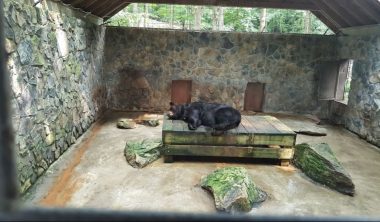
Bosco has spent most of his life in a concrete pit at Pymatuning Deer Park. He will now be moved to one of the now-vacant big cat cages.
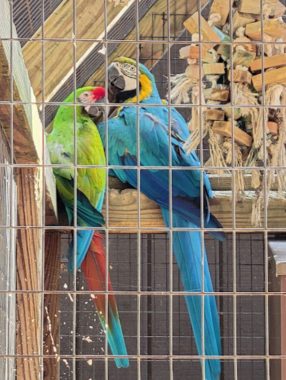
Two bonded macaws were rescued. Military macaws are protected under the Endangered Species Act. The blue-and-yellow macaw was also rescued due to their bond.

Ringo is one of two ring tailed lemurs rescued from Pymatuning Deer Park. Ring tail lemurs are protected under the Endangered Species Act.
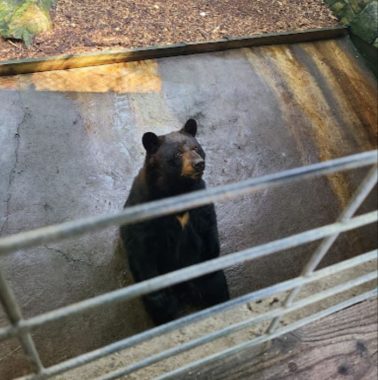
Bosco has spent most of his life in a concrete pit at Pymatuning Deer Park. He will now be moved to one of the now-vacant big cat cages.
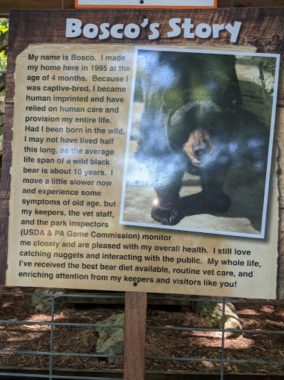
Bosco has spent most of his life in a concrete pit at Pymatuning Deer Park. He will now be moved to one of the now-vacant big cat cages.
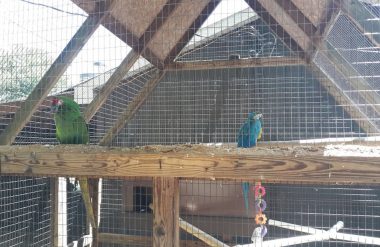
Two bonded macaws were rescued. Military macaws are protected under the Endangered Species Act. The blue-and-yellow macaw was also rescued due to their bond.
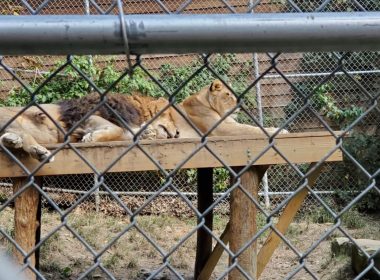
Two lions and a tiger were rescued from Pymatuning Deer Park. Lions and tigers are protected under the Endangered Species Act.
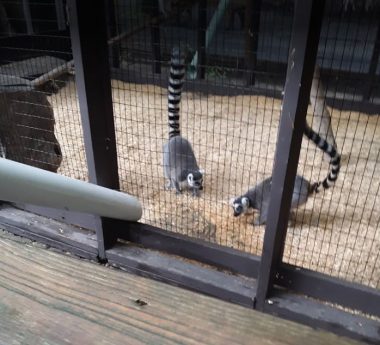
PVC pipes are commonly used at roadside zoos to provide the ability for patrons to feed the animals. Typically gumball machines dispense food, including corn and dog food. The two ring tailed lemurs were rescued from Pymatuning Deer Park. Ring tail lemurs are protected under the Endangered Species Act.
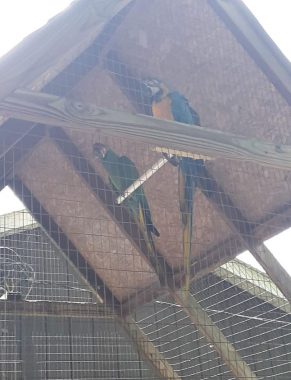
Two bonded macaws were rescued. Military macaws are protected under the Endangered Species Act. The blue-and-yellow macaw was also rescued due to their bond.
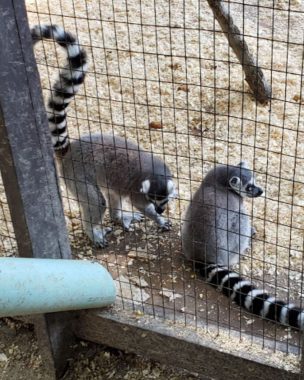
PVC pipes are commonly used at roadside zoos to provide the ability for patrons to feed the animals. Typically gumball machines dispense food, including corn and dog food. The two ring tailed lemurs were rescued from Pymatuning Deer Park. Ring tail lemurs are protected under the Endangered Species Act.
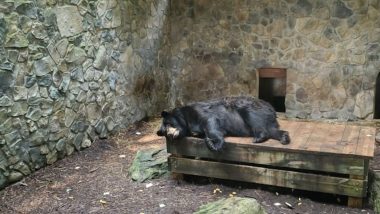
Bosco has spent most of his life in a concrete pit at Pymatuning Deer Park. He will now be moved to one of the now-vacant big cat cages.
Sign Up!
Join the Animal Legal Defense Fund's email list to stay up to date on lawsuits, legislation, and regulations affecting animals.

